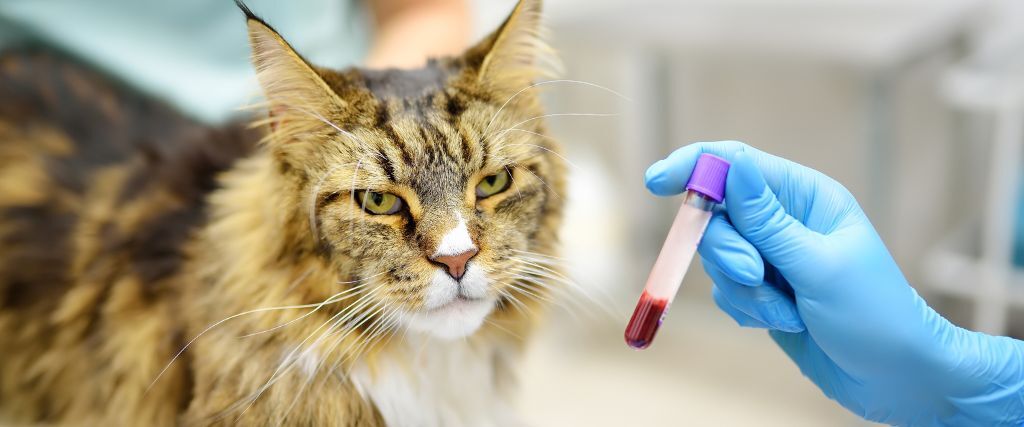Despite the misconception of cats being aloof and solitary, owners often have a deep bond with their cats, and prioritize their health, happiness, and well-being above all else. One essential aspect of prioritizing your cat’s health is understanding what constitutes a healthy baseline for your cat and how regular blood work can provide invaluable insights into their current health status, as well as what’s on the horizon for their health.
To empower cat owners to take a more proactive approach to their cat’s health, we’ll be diving into the significance of establishing cat’s baselines, deciphering blood work drawing procedures and results, and how this knowledge can empower you to make informed decisions for your feline friend's health. Let’s get started!
Why Knowing Your Cat’s Baseline Is So Important
To start, let’s cover the most basic question: What do veterinarians mean when they reference a baseline?
In the context of veterinary medicine, a baseline is considered your cat’s “normal” health and function. Baselines for every cat will be different, as they are based on your cat’s unique health history and bodily function. These baselines, or understandings of your individual cat’s average health, are determined by a series of lab work tests that give your veterinarian greater insight into multiple aspects of your feline friend’s health.
Baseline tests are very important for veterinarians to perform because they give a general idea of what is normal for this particular patient, or if they're coming to us already with an underlying illness or disease, they allow us to get a glimpse at where their health is at that specific point in time. Knowing where a cat’s health stands at that moment is important because as disease progresses or new clinical signs arise, if we were to do blood work moving forward to further investigate, this allows us to compare back to prior blood work to see if this is consistent with this patient or something new that we should be concerned about.

Blood Work and Baseline Tests
Cats are naturally very stoic animals and it can be hard to determine diseases early on if they're not showing outward signs of illness. But that’s where blood work can come in and reveal if your cat is sick or struggling with any medical issues. By doing at least once yearly lab work on our adult and senior feline patients, it allows us to evaluate for any hidden diseases that they may not be showing yet, but might be something we'd want to address sooner rather than later. Regular blood work allows us to truly embrace preventative care and catch any health issues or complications early on to help your cat live a longer and happier life.
One of the most common baseline tests for cats is a Complete Blood Count (CBC). Blood work for CBC looks at a cat’s white and red blood cells, as well as their chemistry panel that looks at overall organ function, like liver, kidney, and electrolytes, as well as a urinalysis. This type of blood work helps evaluate for any abnormalities with our urine production, as well as looking for urinary tract infections.
A veterinary clinic’s laboratory can often also process a number of other types of lab work that your veterinarian may recommend. Be sure to check in with them if you have any questions or concerns regarding lab testing procedures or results for your pet.
When Is Blood Work Necessary for Cats?
There are a number of reasons why your cat might need some lab work done, ranging from your veterinarian wanting to conduct routine lab work to evaluate your cat’s overall health to ordering specific blood panels to diagnose an illness or investigate newly appearing symptoms.
In some cases, blood work can help provide veterinarians with enough information to provide a solid diagnosis of your cat’s underlying medical conditions. For example, if certain markers appear on your cat’s blood work results, that might indicate certain forms of cancer, and allow your veterinarian to proceed with additional focused diagnostics tests.
What Cat Blood Work Entails
What to Expect: The procedure of drawing blood for cats is no more painful than a blood draw at your doctor's visit. Similar to in human medicine, where we insert a needle into the vessel from the outside. Mostly, cats just feel a little bit of a pinch, but once the needle is removed, all the discomfort goes away.
What Your Cat will Feel: Many pet owners are concerned about their cat feeling pain, and may be cautious about having their cat’s blood work done regularly. But don’t worry; drawing blood is virtually painless for animals and at the most your cat may feel a slight pinch. It’s nearly the same needle prick feeling that you may experience at your own doctor’s visits – and it’s over in a flash!

Blood Work and What It Can Tell Us About Cat Health
In addition to CBC, there are additional tests that a veterinarian may order that can help paint a more complete picture of a cat’s health. These include:
- Blood Chemistry Panel: This panel of blood work is done to assess various components in a cat’s blood, such as electrolytes, enzymes, and metabolic byproducts. The results of this type of blood work can help veterinarians identify abnormalities and pinpoint certain organs or body systems that may be at the root of their health issues. Abnormal levels of glucose (indicating diabetes), liver enzymes (suggestive of liver disease), or kidney function markers (indicative of kidney disease) can be identified, aiding in the diagnosis and management of these conditions.
- Thyroid Hormone Levels: Blood work can be used to measure a number of thing’s within a cat’s blood, with one of the most common being thyroid hormone levels. When veterinarians have a clear understanding of the prevalence of thyroid hormones in your cat’s body, they can better diagnose specific conditions like hyperthyroidism (overactive thyroid) or hypothyroidism (underactive thyroid). Thyroid imbalances can affect metabolism, heart function, and overall well-being, meaning they should be identified and addressed as early as possible.
- Feline Leukemia Virus (FeLV) and Feline Immunodeficiency Virus (FIV) Testing: Blood work can detect the presence of these viruses, which weaken the immune system and increase the risk of infections and certain cancers in cats. These viruses can be common in stray cats or cats living outside, which is why veterinarians will commonly conduct this type of testing on a cat’s first vet visit or after a stray cat has been adopted.
- Blood Pressure Measurement: Blood pressure irregularities can affect numerous facets of a cat’s health, but can thankfully be identified through common lab work. Hypertension (high blood pressure) is common in older cats and can lead to organ damage, particularly affecting the eyes, kidneys, and heart. Blood work combined with blood pressure measurement can help diagnose and manage hypertension in cats, allowing them to live longer and happier lives.
Have a Healthier Cat By Knowing Their Baseline
Understanding your cat’s baseline and complying with regular blood work recommendations is a cornerstone of great cat care and can help your fluffy friend live their life to the fullest. When you and your veterinarian know what’s normal for your cat, you can better identify abnormalities and get your cat the medical attention it needs – and deserves.
If you have questions and you'd like to reach out to us, you can call us directly at (936) 856-0200, or you can email us at #. Don't forget to follow us on social media Facebook, Instagram.

